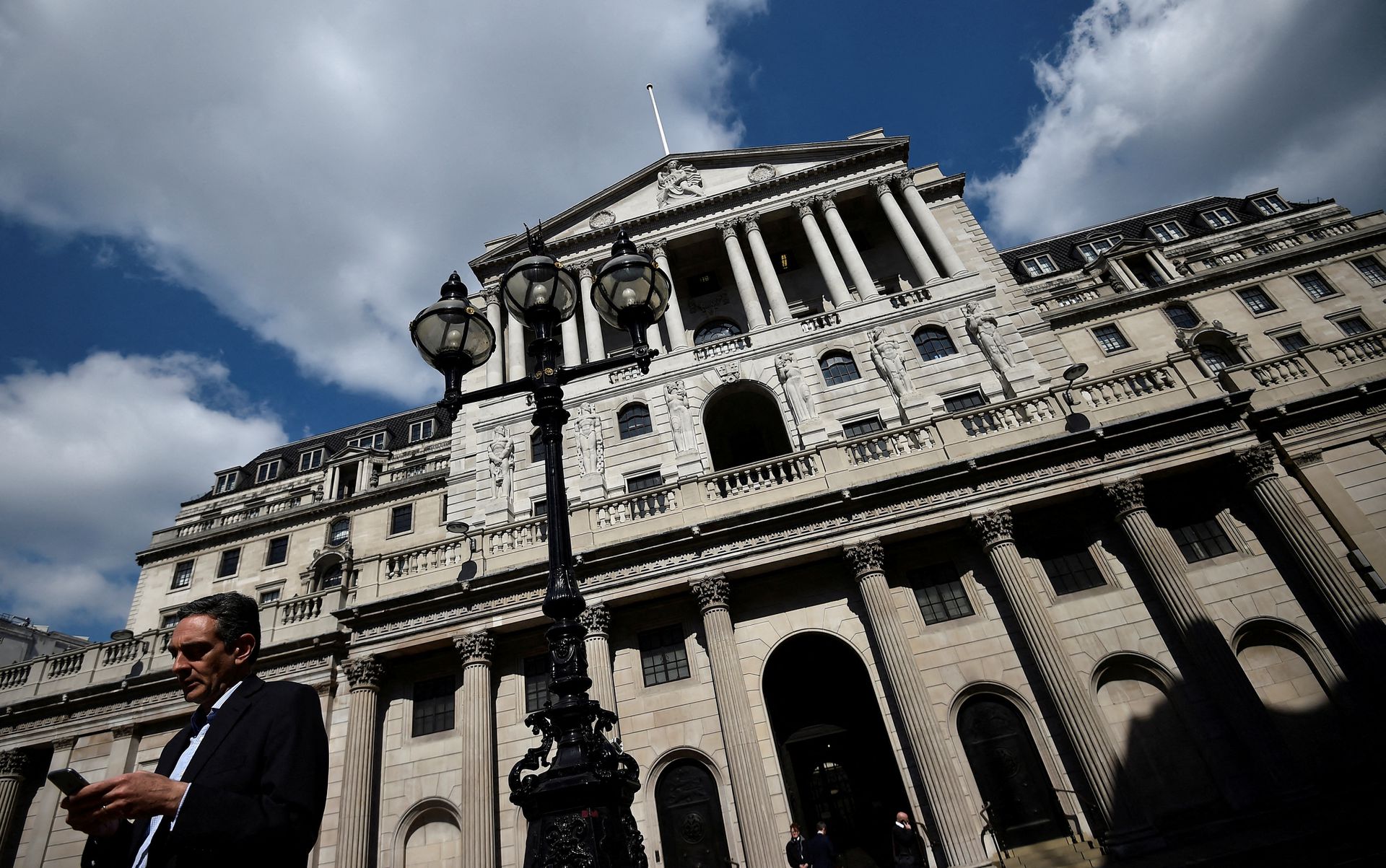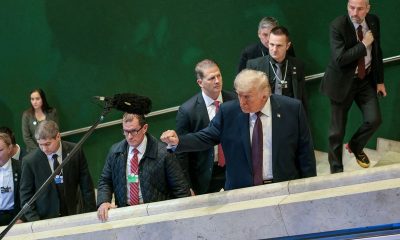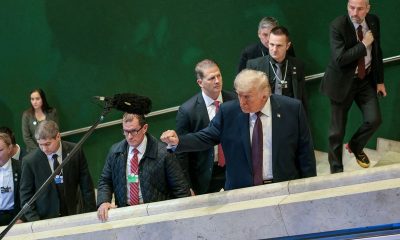Economy
Bank of England poised to raise rates after inflation shock

The Bank of England is set to raise interest rates for a 13th time in a row on Thursday, a day after inflation data came in higher than expected once again, with investors split on just how big the new hike will be.
Economists polled by Reuters last week were unanimous that the BoE would raise rates to 4.75%, their highest since 2008, from 4.5%.
But after inflation held at 8.7% in May, investors were pricing a 45% chance that the BoE would opt for a bigger move and raise rates by half a percentage point, even as fears mount about the hit to mortgage-holders and the risk of a recession.
“I think it’s a very finely balanced decision,” said Tomasz Wieladek, chief European economist at U.S investment firm T. Rowe Price, who predicts at least three of the Monetary Policy Committee’s nine members will vote for a half-point hike.
Britain’s economy, which has been hit by the shock of Brexit as well as the COVID-19 pandemic and the surge in gas prices caused by Russia’s invasion of Ukraine, has dodged a widely expected recession so far in 2023 though growth looks set to be a minimal 0.25% this year, according to the BoE’s forecasts.
Unlike most other big rich economies, output has barely recovered to pre-pandemic levels.
However, two inflation readings since the BoE’s last rate hike in May have both been higher than expected.
“It’s pretty clear that our inflation problem is a bit worse than elsewhere,” Charles Bean, a former BoE deputy governor, told BBC radio, adding he would vote for a half-percentage point hike now if he were still at the central bank.
Another former BoE rate-setter, Martin Weale, said Britain’s weak productivity growth and its shortage of workers meant a recession was on the cards as interest rates go up.
“Reducing demand in the economy is quite likely to lead to a recession,” he told Sky News.
Households are now also seeing their mortgage bills rise, with average new two-year fixed-rates rising to 6.15% on Wednesday in anticipation of further rate hikes.
Financial markets were estimating that the BoE would keep raising rates until they hit 6% – their highest since 2001 – more than the U.S. Federal Reserve which is seen tightening by just a quarter point more and the European Central Bank which investors expect may move twice more.
“The UK has a uniquely bad inflation problem,” Krishna Guha, a vice chairman at U.S. investment banking advisory firm Evercore, said.
Prime Minister Rishi Sunak – who has pledged to halve inflation this year in an attempt to win back voter support ahead of a national election expected in 2024 – has said he fully backs the BoE’s efforts to tame prices.
“I feel a deep moral responsibility to make sure the money you earn holds its value,” Sunak will say at an event on Thursday, according to advanced extracts released by his office.
Sky News said unnamed members of the government thought Governor Andrew Bailey was failing at his job.
FALLING FASTER?
The central bank last month forecast that consumer price inflation, which peaked at a 41-year high of 11.1% in October 2022, would fall to just over 5% by the end of this year and be below its 2% target in early 2025.
A significant inflation drop is almost inevitable as energy prices come down from last year’s peaks.
But incoming BoE policymaker Megan Greene – who will join the MPC next month – said last week that getting inflation from 5% to 2% may prove a tougher task than the initial fall.
Core inflation – which strips out more volatile prices to show an underlying trend – rose to a 31-year high in May.
Wieladek, who worked at the BoE from 2008 to 2015, said wages looked set to keep on growing at an annual rate of around 6%, almost twice the level consistent with 2% inflation, given the shortage of workers available to many employers.
In previous decades, British wage growth has only slowed after a large rise in unemployment, and Wieladek estimated the BoE would need to engineer a recession that pushed unemployment up to 6.0%-6.5% from its current 3.8% to achieve this now.
“Unfortunately, the Bank of England is in a situation where they will have to hike until something breaks,” he said.
Most economists are less gloomy and think rates are more likely to peak near 5% as recent falls in energy and raw material costs affect the price of other goods and services.
“Market pricing for a lot more rate hikes could reverse quite quickly – especially if weaker inflation is ultimately allied with easing wage pressures,” strategists at Nomura wrote.
Economy
Russian central bank says it needs months to make sure CPI falling before rate cuts -RBC


© Reuters. Russian Central Bank Governor Elvira Nabiullina attends a news conference in Moscow, Russia June 14, 2019. REUTERS/Shamil Zhumatov/File Photo
MOSCOW (Reuters) – Russia’s central bank will need two to three months to make sure that inflation is steadily declining before taking any decision on interest rate cuts, the bank’s governor Elvira Nabiullina told RBC media on Sunday.
The central bank raised its key interest rate by 100 basis points to 16% earlier in December, hiking for the fifth consecutive meeting in response to stubborn inflation, and suggested that its tightening cycle was nearly over.
Nabiullina said it was not yet clear when exactly the regulator would start cutting rates, however.
“We really need to make sure that inflation is steadily decreasing, that these are not one-off factors that can affect the rate of price growth in a particular month,” she said.
Nabiullina said the bank was taking into account a wide range of indicators but primarily those that “characterize the stability of inflation”.
“This will take two or three months or more – it depends on how much the wide range of indicators that characterize sustainable inflation declines,” she said.
The bank will next convene to set its benchmark rate on Feb. 16.
The governor also said the bank should have started monetary policy tightening earlier than in July, when it embarked on the rate-hiking cycle.
Economy
China identifies second set of projects in $140 billion spending plan


© Reuters. FILE PHOTO: Workers walk past an under-construction area with completed office towers in the background, in Shenzhen’s Qianhai new district, Guangdong province, China August 25, 2023. REUTERS/David Kirton/File Photo
SHANGHAI (Reuters) – China’s top planning body said on Saturday it had identified a second batch of public investment projects, including flood control and disaster relief programmes, under a bond issuance and investment plan announced in October to boost the economy.
With the latest tranche, China has now earmarked more than 800 billion yuan of its 1 trillion yuan ($140 billion) in additional government bond issuance in the fourth quarter, as it focuses on fiscal steps to shore up the flagging economy.
The National Development and Reform Commission (NDRC) said in a statement on Saturday it had identified 9,600 projects with planned investment of more than 560 billion yuan.
China’s economy, the world’s second largest, is struggling to regain its footing post-COVID-19 as policymakers grapple with tepid consumer demand, weak exports, falling foreign investment and a deepening real estate crisis.
The 1 trillion yuan in additional bond issuance will widen China’s 2023 budget deficit ratio to around 3.8 percent from 3 percent, the state-run Xinhua news agency has said.
“Construction of the projects will improve China’s flood control system, emergency response mechanism and disaster relief capabilities, and better protect people’s lives and property, so it is very significant,” the NDRC said.
The agency said it will coordinate with other government bodies to make sure that funds are allocated speedily for investment and that high standards of quality are maintained in project construction.
($1 = 7.1315 renminbi)
Economy
Russian central bank says it needs months to make sure CPI falling before rate cuts -RBC


© Reuters. Russian Central Bank Governor Elvira Nabiullina attends a news conference in Moscow, Russia June 14, 2019. REUTERS/Shamil Zhumatov/File Photo
MOSCOW (Reuters) – Russia’s central bank will need two to three months to make sure that inflation is steadily declining before taking any decision on interest rate cuts, the bank’s governor Elvira Nabiullina told RBC media on Sunday.
The central bank raised its key interest rate by 100 basis points to 16% earlier in December, hiking for the fifth consecutive meeting in response to stubborn inflation, and suggested that its tightening cycle was nearly over.
Nabiullina said it was not yet clear when exactly the regulator would start cutting rates, however.
“We really need to make sure that inflation is steadily decreasing, that these are not one-off factors that can affect the rate of price growth in a particular month,” she said.
Nabiullina said the bank was taking into account a wide range of indicators but primarily those that “characterize the stability of inflation”.
“This will take two or three months or more – it depends on how much the wide range of indicators that characterize sustainable inflation declines,” she said.
The bank will next convene to set its benchmark rate on Feb. 16.
The governor also said the bank should have started monetary policy tightening earlier than in July, when it embarked on the rate-hiking cycle.

 Forex4 years ago
Forex4 years agoForex Today: the dollar is gaining strength amid gloomy sentiment at the start of the Fed’s week

 Forex3 years ago
Forex3 years agoUnbiased review of Pocket Option broker

 Forex3 years ago
Forex3 years agoDollar to pound sterling exchange rate today: Pound plummeted to its lowest since 1985

 Forex3 years ago
Forex3 years agoHow is the Australian dollar doing today?

 Cryptocurrency3 years ago
Cryptocurrency3 years agoWhat happened in the crypto market – current events today

 World3 years ago
World3 years agoWhy are modern video games an art form?

 Commodities3 years ago
Commodities3 years agoCopper continues to fall in price on expectations of lower demand in China

 Economy3 years ago
Economy3 years agoCrude oil tankers double in price due to EU anti-Russian sanctions

























